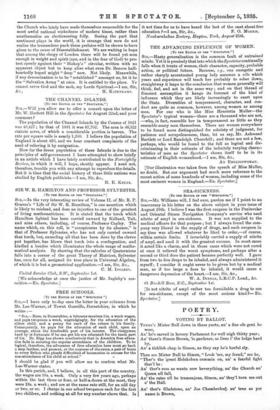THE ADVANCING INFLUENCE OF WOMEN.
[To THE EDITOR Or THE " SPECTATOR."] SIR,—Hasty generalisation is the common fault of untrained minds. Yet it is precisely that into which the Spectator continually falls when it treats of women, their character, capacity, probable action, or political future. Because, e.g., one energetic and rather sharply accentuated young lady assumes a role which years and experience will teach her probably to sober down, straightway it leaps to the conclusion that women generally will think, feel, and act in the same way ; and on that thread of flimsiest assumption it hangs its forecast of the kind of influence which they are likely increasingly to exert upon the State. Diversities of temperament, character, and con- duct are quite as common, however, among women as among men. For one who is like Miss Henrietta Muller—the Spectator's typical woman—there are a thousand who are not, —who, in fact, resemble her in temperament as little as they resemble many men themselves. There are women everywhere to be found more distinguished for sobriety of judgment, for patience and scrupulousness, than, let us say, Mr. Ashmead Bartlett or Lord Randolph Churchill ; and there are not a few, perhaps, who would be found to the full as logical and dis- criminating in their estimate of the infinitely varying charac- teristics of men as the Spectator shows itself to be in its estimate of English womanhood.—I am, Sir, &c.,
AN ENGLISHWOMAN.
[Our illustration was taken from the speech of Miss Muller, no doubt. But our argument had much more reference to the recent action of some hundreds of women, including some of the most eminent women in England.—En. Spectator.]


































 Previous page
Previous page